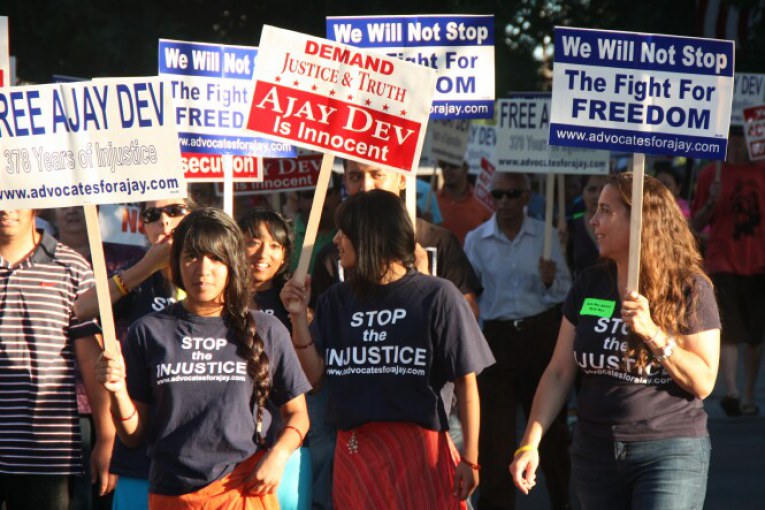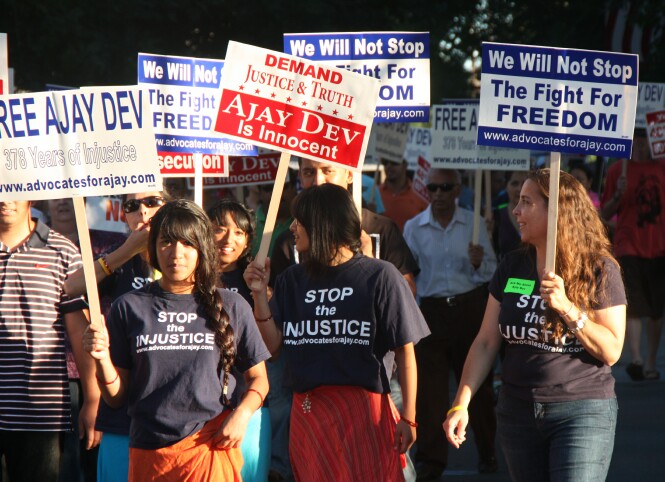

On Monday, Ajay Dev’s case will be back in Judge Janene Beronio’s Yolo County courtroom. As most who have read these pages for any length of time know, I have long believed that Ajay Dev was wrongly convicted on 76 counts of raping his adopted daughter.
At the same time, what many may not remember is long before I was convinced of his innocence, I was convinced that his sentence was fundamentally unjust. Three hundred seventy-eight years? For a non-lethal offense? There are people who kill others who are out far more quickly.
On Thursday, I was interviewing Joe Kimok, a candidate for state attorney in Broward County, Florida, the equivalent of a district attorney here. He was pushing for not only a wrongful conviction unit, but a sentencing review unit.
He noted: “Our prisons are starting to look like nursing homes. As a result of unnecessarily long prison sentences handed out over the past several decades, Florida taxpayers are spending billions of dollars to continue to incarcerate folks who simply no longer need to be in prison… No one is the same person at 50 that they were at 20. We should bring folks home that are no longer a danger to our community.”
The Sentencing Review Unit would be “dedicated to investigating and reviewing old, unnecessarily long sentences.” As appropriate, he proposes bringing these cases “before the courts and recommend an early termination of their prison time.”
The Conviction Integrity Unit developed in Yolo is only designed for claims of factual innocence. Repeated records requests show that, in the five years of its existence, the unit has reviewed few cases and advanced none of them to a second level of review.
For all of the people arguing that Jeff Reisig is so progressive, we really are behind the times. Not only is our Conviction Review Unit largely non-functional, having done nothing to review or  remedy what I believe to be a whopping 14 wrongful convictions in Yolo County, but also we don’t have a Sentencing Review Unit.
remedy what I believe to be a whopping 14 wrongful convictions in Yolo County, but also we don’t have a Sentencing Review Unit.
By contrast, recently elected San Francisco District Attorney Chesa Boudin has announced that his Wrongful Conviction Unit would report directly to the DA, and would be empowered to “review past convictions and make policy recommendations to avoid future wrongful convictions.” Furthermore, he would establish an “innocence commission of experts to pre-screen cases for the WCU.”
During his campaign, he added the issue of excessive sentences to his platform, stating, “I’m going to start a wrongful conviction unit and review excessive sentences.”
This marks an important innovation that was begun with the work of Larry Krasner in Philadelphia. Prior to his office, no one had combined the work of conviction review with “the far more ambitious task of examining cases where the conviction might be sound but the punishment doesn’t fit the crime.”
It is a daunting undertaking, as it opens the floodgate to review potentially thousands of sentences.
An editorial in the NY Times last summer explains how it could work.
James Forman, Jr., a law professor at Yale, and Sarah Lustbader, senior legal counsel at the Justice Collaborative who also writes for the Appeal, did an op-ed in the NY Times on August 1 arguing every DA in America should open a Sentence Review Unit.
They note: “The Sentencing Project reports that one in seven American prisoners is serving either a life sentence or its functional equivalent.”
However, at the same time, “there is growing momentum to reduce excessive sentences. Legislation authorizing sentence reductions in old cases has passed in California and the District of Columbia.”
One solution to the problem: “Prosecutors can recognize their role in creating the crisis and work toward fixing it. They should start by opening ‘sentence review units,’ which would consist of small dedicated teams of lawyers, investigators, data scientists and social workers within the prosecutor’s office.”
How this could work: prosecutors would have a chance to give some of these cases a second look.
They write: “Social workers and investigators would sit down with incarcerated people and their families to better understand what brought the individuals to prison and how they have changed during their years behind bars. If the team decides that release would serve the interests of justice and public safety, the prosecutor could argue for those long-incarcerated people to be reunited with their communities.”
Sentence review units would seek out cases where the sentence is excessive. We may consider this overcharging or over-incarceration.
They write: “What counts as ‘excessive’ is necessarily a judgment call, but examples include sentences that in retrospect seem disproportionate to the severity of the offense, or those that are far longer than what a person sentenced today would receive.”
Let’s look at the case of Ajay. One of our old conservative commentators, whom I rarely agree with on anything, points out that even if Mr. Dev did the crime – which he admits is questionable at best, he has served 10 years.
Ajay Dev had no criminal record. By all accounts he has been a model prisoner since he has been in there. The guards and administrative staff are absolutely convinced this guy didn’t do the crime.
At this point, what is the social benefit of keeping him incarcerated and away from his two sons?
Larry Krasner, Philadelphia’s district attorney, intends to open a sentence review unit. “Sometimes extreme sentences reflect unscientific beliefs; sometimes they reflect racism; and sometimes they reflect judges who punish you 10 times harder if you went to trial.”
He added, “There are a lot of people in jail who very clearly don’t need to stay in jail.”
It seems like something Yolo should consider opening – but only if the DA is going to make it more than just window dressing.
—David M. Greenwald reporting


The article uses the Ajay Dev example:
In that case, was there any actual crime? Or a fabrication?
If there was a crime, did the defendant commit it?
Those are the important questions… I have come to believe there was no crime, and someone cannot commit a crime that never happened.
Now, the focus of the article… if there was a crime, and if the defendant committed it, was the sentencing reflective of the criminal culpability?
Not sure a sentencing review board can make up for the failures of the first two “tests”… if there was no crime, a ‘sentence’ of one day incarcerated is unjust. And they’d still have a conviction on their record… that would ‘follow’ them.
In the alternate scenario… if a crime was committed, and the defendant was culpable, the severity of the sentence is certainly open to review… but it is a ‘one-way street’… a “hanging judge” sentence can be reduced… but a uber lenient judge’s sentencing cannot be increased… the athlete from Palo Alto (Stanford) a few years back comes to mind… as I recall he was found guilty of rape, and had a grossly lenient sentencing.
Interesting that the article proposes that sentencing review be within the purview of the DA’s office. What makes you think this would be something “more than just window dressing” in the hands of any but the most progressive DA offices?
Moreover DAs have no authority to modify sentences. Not even judges have such authority, except under very limited circumstances—e.g., misapplication of the law, or if there’s a change in law that applies retroactively (e.g., SB 1437). It seems that there would have to be some prior legislative authorization if this process is to be meaningful.
Eric – you are correct. The idea is relatively new. One of the things Miriam Krinsky, who I will have on a podcast in two weeks, believes is that it would require new legislation to allow DA’s to file a special motion for amending a sentence.
Perhaps we can eliminate the length altogether and replace it with conditions. If a dangerous person is to be put in prison, the sentence is always “until they are no longer a threat.”
While in prison, the prisoner is free to join programs to show why they are no longer a threat. Then we don’t need a committee to review “sentences” but to review the threat level of the prisoners.
Damages are debts that the convicted may repay inside or outside prison.
We put people in prison only to isolate threats. That is not a form of punishment but community self defense. The alternative would have been death sentence.
On an also important note, I think rape is akin to torture. That should be worse than murder.
Torturing is more “evil” than killing. As long as society does not see this, society will breed a lot of evil acts base on “we can do whatever as long as we don’t kill people”.